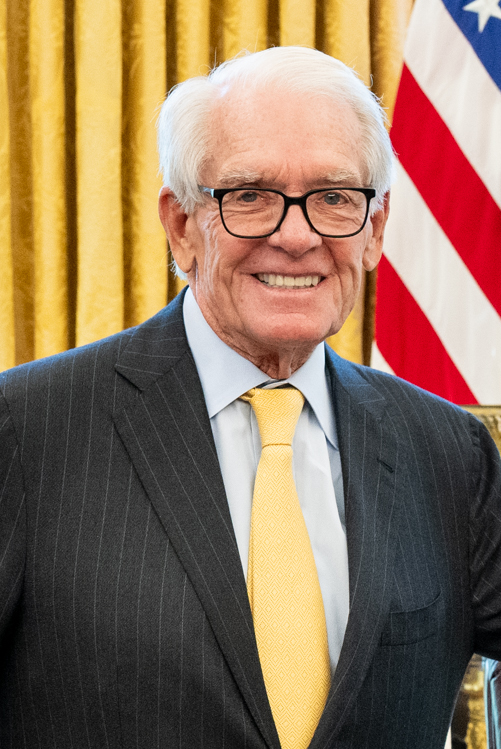Early Life and Education
Charles Schwab, one of the most recognized figures in American finance, was born in Sacramento, California, in 1937. Growing up during a period when the American economy was finding its footing after the Great Depression, Schwab developed an early interest in how businesses and individuals managed money. His upbringing taught him the value of hard work, persistence, and adaptability—traits that would later define his success. After high school, he attended Stanford University, where he earned a degree in economics and later obtained a Master of Business Administration from the Stanford Graduate School of Business. His time at Stanford not only honed his academic knowledge but also exposed him to entrepreneurial thinking, laying the foundation for his future in financial innovation.
The Beginning of His Financial Journey
In the early stages of his career, Schwab explored various roles in the financial sector, observing how traditional brokerage firms operated. During this time, he became increasingly aware of the inefficiencies and lack of accessibility in the investment industry. Brokerage services were dominated by large firms that charged high commissions, making investing a privilege reserved for the wealthy. Schwab envisioned a system where ordinary people could invest and build wealth without excessive fees. This idea would eventually lead him to revolutionize the investment world.
Founding of The Charles Schwab Corporation
In 1971, Charles Schwab founded what would become The Charles Schwab Corporation, initially called First Commander Corporation. His goal was simple yet transformative: to create a brokerage service that prioritized the customer’s needs over profit margins. When U.S. regulators deregulated the stock brokerage industry in 1975, Schwab seized the opportunity to introduce a discount brokerage model. This innovative approach offered lower fees, greater transparency, and access to financial tools for everyday investors. The company’s focus on customer satisfaction and technological efficiency quickly set it apart from competitors.
Revolutionizing the Investment Industry
Charles Schwab’s business model changed how people viewed investing. Before his innovations, investors often relied on brokers who controlled information and charged high commissions. Schwab’s introduction of low-cost trading, combined with open communication and client education, democratized investing. He was among the first to embrace technology, introducing online trading platforms and automated customer service long before they became industry standards. These advancements empowered investors to take control of their portfolios, fostering financial literacy among millions.
Net Worth and Financial Success
As of recent estimates, Charles Schwab’s net worth is approximately $12 billion. His wealth primarily comes from his stake in The Charles Schwab Corporation, which has grown into one of the largest financial services firms in the world. The company manages trillions of dollars in assets and serves millions of clients globally. Schwab’s fortune has fluctuated with the market, but his long-term success reflects his strategic thinking and commitment to long-term value creation rather than short-term profit. Beyond his personal wealth, Schwab’s company has generated significant economic impact, creating jobs and fostering financial independence for countless individuals.
Leadership Philosophy and Business Ethics
Schwab’s leadership philosophy is deeply rooted in simplicity, transparency, and customer empowerment. He believed that the financial industry should serve people, not the other way around. His decisions consistently reflected this belief, from reducing fees to investing heavily in customer service and innovation. He built a company culture centered on trust, integrity, and accessibility. Schwab’s management approach also emphasized listening to clients and employees, creating a responsive and adaptive organization. His leadership style proved that ethical business practices and profitability can coexist and even reinforce one another.
Challenges and Resilience
Like all great entrepreneurs, Charles Schwab faced challenges along his journey. The company encountered competition, market crashes, and regulatory shifts that tested its resilience. During the dot-com bubble and the financial crisis of 2008, Schwab had to make critical decisions to protect clients’ interests while maintaining corporate stability. His ability to navigate through turbulent times showcased his foresight and calm under pressure. Instead of retreating, he doubled down on his commitment to transparency and customer focus, which helped rebuild trust and solidify his firm’s position as a financial leader.
Technological Innovations and Modernization
One of Schwab’s defining achievements was his early recognition of technology’s role in finance. Long before online trading became commonplace, he invested in digital platforms to streamline transactions and improve user experience. In the 1990s, Charles Schwab & Co. became a pioneer in offering internet-based investing, which attracted millions of new investors. Today, the firm continues to lead in financial technology, with advanced tools, mobile apps, and AI-driven advisory services that make investing simpler and more personalized. Schwab’s embrace of innovation helped position his company as a forward-thinking powerhouse in a competitive market.
Philanthropy and Personal Life
Beyond business, Charles Schwab is known for his philanthropy and contributions to education, health, and research. He has donated hundreds of millions of dollars to charitable causes through the Charles and Helen Schwab Foundation. One of his major focuses has been supporting individuals with learning disabilities—a cause close to his heart, as he himself has dyslexia. His efforts have helped improve educational resources and awareness, providing support for countless students. Schwab’s philanthropic work reflects his belief in equal opportunity and empowerment, values consistent with his approach to business and investing.
Personal Traits and Lifestyle
Despite his immense wealth, Charles Schwab is known for his modest and disciplined lifestyle. He avoids the extravagant habits often associated with billionaires, preferring instead to focus on his work, family, and charitable activities. Those who know him describe him as humble, thoughtful, and strategic. His success did not make him complacent; instead, it reinforced his desire to continue learning and improving. Schwab’s personal habits, such as consistency and a strong work ethic, have played a vital role in sustaining his achievements over the decades.
Legacy and Impact on Global Finance
Charles Schwab’s influence extends far beyond his company. He redefined the brokerage industry and set new standards for accessibility, ethics, and innovation in financial services. His model inspired competitors and shaped modern investment platforms, including robo-advisors and commission-free trading apps. By breaking down barriers to entry, Schwab helped millions of people participate in the financial markets and plan for their futures. His work not only made investing more inclusive but also transformed how people perceive financial independence and wealth management.
Lessons from Charles Schwab’s Success
Schwab’s journey offers valuable lessons for aspiring entrepreneurs and investors. His story highlights the importance of identifying inefficiencies, challenging established norms, and prioritizing the customer. He demonstrated that vision and integrity can drive long-term success in any industry. Schwab also showed how adaptability—particularly the willingness to embrace technology—can sustain a company’s relevance through changing times. His legacy reminds business leaders that true success is measured not just in wealth but in the positive impact one creates on society.
Conclusion: The Enduring Influence of a Financial Pioneer
Charles Schwab’s life and career stand as a testament to innovation, determination, and ethical entrepreneurship. From a visionary idea in the early 1970s to a financial empire managing trillions in assets, his journey reshaped global investing. His estimated $12 billion net worth reflects not only his personal success but also the trust and value he has built for millions of clients. Schwab’s contributions go beyond wealth accumulation; they lie in empowering individuals to take control of their financial destinies. His story continues to inspire investors, entrepreneurs, and dreamers who believe that accessibility and integrity can transform industries and change lives.

Starsfame delivers accurate celebrity news, exclusive updates, and inspiring stories about your favorite stars.











